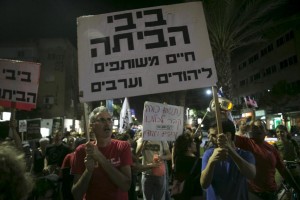Americans for Peace Now welcomes the statement issued by the European Union's foreign ministers, which states that no European agreements with Israel would be applicable in the Occupied Territories and reiterating the EU's policy of labeling products made in West Bank Israeli settlements.
This week, Alpher discusses the Iran nuclear deal being fully implemented, with sanctions lifted earlier than originally predicted, and the US and Iran exchanging detainees; where these leave Washington’s relations with Israel and the Sunni Arab states; and the essentially Sunni Arab movements of Islamic State and al-Qaeda and the collapse of several Arab states - how and why all this began five years ago and whether we have figured that out so we can avoid repeating past mistakes.

On January 14, 2016, APN, together with New Israel Fund (NIF), J Street, Ameinu, T’ruah, Partners for Progressive Israel (PPI), Foundation for Middle-East Peace (FMEP), and B'Tselem USA, hosted MK Merav Michaeli, former Deputy Knesset Speaker Naomi Chazan, and Attorney Michael Sfard, moderated by Matt Duss, President of the Foundation for Middle East Peace for a conversation on the legislation now being considered by the Knesset that targets progressive NGOs for extra scrutiny of their foreign donations, but does not require similar scrutiny of right-wing or settler groups.
This legislation is part of a long-term effort by some Israeli hardliners, backed by the government, to weaken Israel’s democracy by stifling dissent. While its supporters attempt to liken it to existing US law, it has drawn significant opposition from many quarters, both within Israel, from the US State Department and among the American Jewish community. And still, there is a real possibility that the bill will pass in the next few weeks.
 On Thursday, January 14, APN's Lara Friedman joined Zeina Azzam, the
Executive Director of the Jerusalem Fund for a panel moderated by John Feffer, the Director for Epicenter
at the Institute for Policy Studies in Washington DC for a panel discussing the performance Wrestling
Jerusalem. More information can be found here.
On Thursday, January 14, APN's Lara Friedman joined Zeina Azzam, the
Executive Director of the Jerusalem Fund for a panel moderated by John Feffer, the Director for Epicenter
at the Institute for Policy Studies in Washington DC for a panel discussing the performance Wrestling
Jerusalem. More information can be found here.
News from Peace Now's (Israel) Settlement Watch:
Last week the High Court rejected a petition submitted by landowners of the village of Nahla, located south of
Bethlehem, and approved the declaration of 1,341 of their lands as state land. This petition was the last legal
obstacle that stood in the way of the government's plan to establish a new settlement with thousands of housing
units east of the separation barrier in Givat Eitam. The plan, known as "E2," has disastrous consequences on the
two state solution as it blocs Bethlehem from the south and cuts the southern part of the West Bank in half, quite
similarly to the plan known as E1.
The Knesset is now considering legislation that targets progressive NGOs for extra scrutiny of their foreign donations, but does not require similar scrutiny of right-wing or settler groups. This legislation is part of a long-term effort by some Israeli hardliners, backed by the government, to weaken Israel’s democracy by stifling dissent. While its supporters attempt to liken it to existing US law, it has drawn significant opposition from many quarters, both within Israel, from the US State Department and among the American Jewish community. And still, there is a real possibility that the bill will pass in the next few weeks.
Israeli Justice Minister Ayelet Shaked is trying to sell the argument that her pending “NGO transparency” bill is no different than a U.S. law called the Foreign Agents Registration Act, or FARA. In reality, the two pieces of legislation are worlds apart in intent and effect, and the differences go to the heart of the problems with Shaked’s bill.
First, FARA applies to all foreign funding – governmental and private – of U.S. persons or organizations, ensuring transparency about any foreign donor’s efforts to sway U.S. policy. The Shaked bill applies only to funding from foreign governments – funding that is already transparent under existing Israeli law. The measure does not apply to funding from nongovernmental foreign sources.
This distinction is neither accidental nor trivial. Israel’s progressive nongovernmental organizations are the main recipients of funding from foreign governments that support the progressive, democratic values embodied by these NGOs. Shaked, who has made clear her desire to quash dissent, has crafted her bill to target only these NGOs while permitting those that promote agendas more in line with her own views to continue to operate as always. The discrimination implicit in this bill is so clear that even Israeli Knesset member Michael Oren, a former U.S. ambassador, has criticized its “one-sided exposure, which ignores the funding sources of extreme-right nonprofits.”
 Unable to deliver real solutions to the ongoing violence, Israeli governments have been
trying for years to blame the messengers rather than take responsibility for their own policies. Last week,
this practice was taken to the next level when a ministerial committee approved the NGO bill, proposed
legislation targeting specifically peace and human rights organizations.
Unable to deliver real solutions to the ongoing violence, Israeli governments have been
trying for years to blame the messengers rather than take responsibility for their own policies. Last week,
this practice was taken to the next level when a ministerial committee approved the NGO bill, proposed
legislation targeting specifically peace and human rights organizations.
Under the pretense of increasing transparency on donations received from foreign governments, the bill’s actual intention is to delegitimize any organization that criticizes the government's policies. According to the proposed legislation, members of left-leaning organizations, who already submit quarterly reports on donations from foreign governments, will be obligated to wear special badges and to identify themselves as “foreign agents.”
If the proposed legislation is truly aimed at increasing transparency, it must require all NGOs to expose their funding sources, instead of denouncing left-wing organizations, which are already held to higher transparency standards.
Even as Israel endures daily “lone wolf” attacks from young Palestinians prepared to die for the cause of spilling Jewish blood, American Jewish leaders confide that generating support for the Jewish state is becoming increasingly difficult these days — even within the Jewish community, and especially among younger people.
In contrast to the widespread emotional identification shown for Parisians and others around the world who have been attacked by Islamic militants, it is hard to find much empathy out there for Israelis seeking to go on with their lives amidst the prospect of violence they face each day.
In a series of private conversations in recent days with a variety of professionals who make their living advocating for Israel and Jewish causes, I was struck by a consistent theme I heard: deep concern about Israel’s future and its relationship with diaspora Jewry. There was a feeling that the political and diplomatic situation is getting worse as Israel is increasingly isolated on the international scene — even spied on by the U.S., we learned last week.
Closer to home, efforts by the last Knesset to liberalize positions on personal religious status — on such issues as conversion, marriage, divorce and women’s prayer at the Kotel — have been reversed by the current coalition in Jerusalem. That is one more signal to the great majority of American Jews, who are not Orthodox, that they are seen as second-class Jews in the eyes of the State of Israel they are urged to support.
Continue ReadingNews from Peace Now's (Israel) Settlement Watch:
Two important settlement developments in this update:
1. Appointed Attorney General proposes to confiscate private Palestinian lands for
settlements
2. A new settlement established south of Bethlehem
